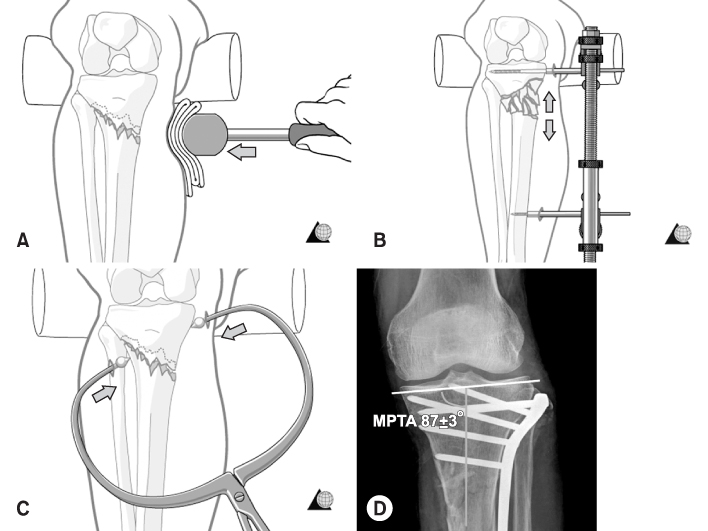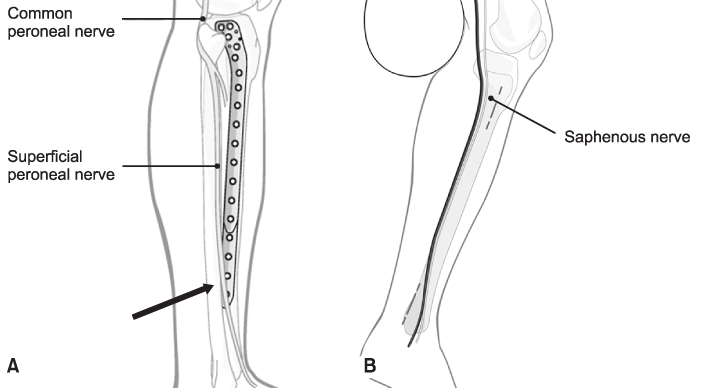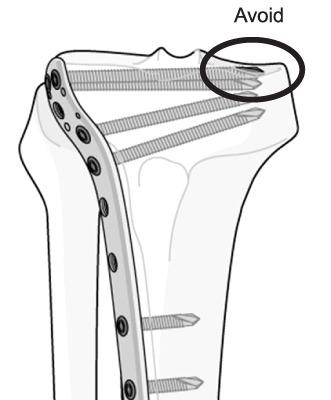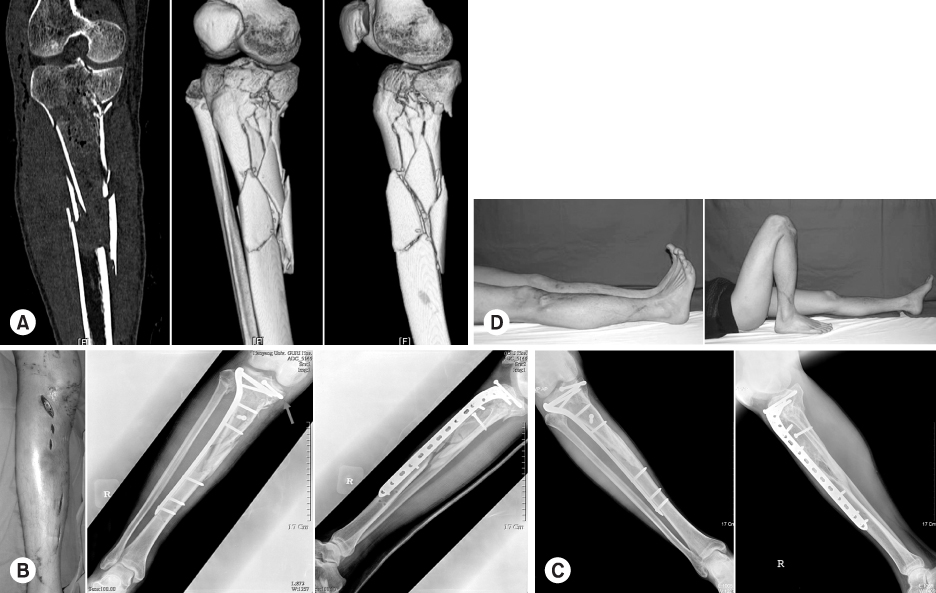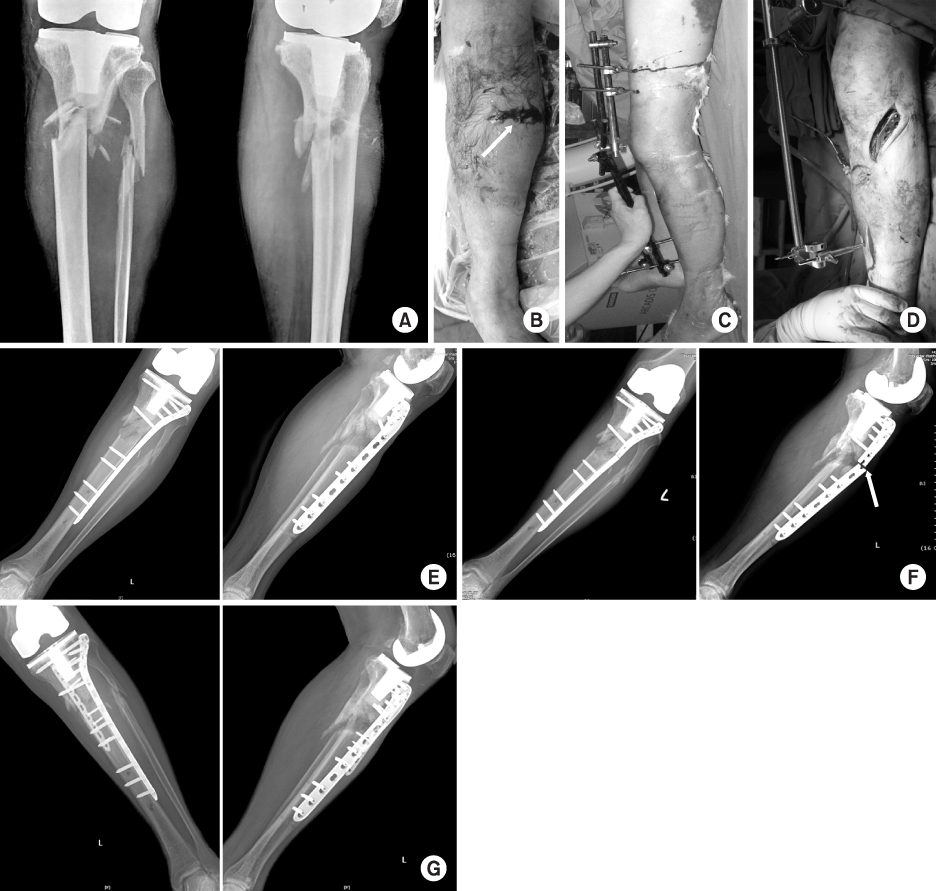J Korean Fract Soc.
2009 Jul;22(3):206-213. 10.12671/jkfs.2009.22.3.206.
Proximal Tibia Fracture: Plating
- KMID: 2063912
- DOI: http://doi.org/10.12671/jkfs.2009.22.3.206
Abstract
- No abstract available.
MeSH Terms
Figure
Cited by 2 articles
-
Minimally Invasive Percutaneous Plate Stabilization Using a Medial Locking Plate for Proximal Tibial Fractures - Technical Note -
Jae Ang Sim, Beom Koo Lee, Kwang Hui Kim, Yong Seuk Lee
J Korean Fract Soc. 2013;26(4):327-332. doi: 10.12671/jkfs.2013.26.4.327.Medial Minimally Invasive Percutaneous Plate Osteosynthesis in Proximal Tibial Comminuted Fractures
Jae-Ang Sim, Kwang-Hui Kim, Yong-Seuk Lee, Sang-Jin Lee, Beom-Koo Lee
J Korean Orthop Assoc. 2014;49(4):278-284. doi: 10.4055/jkoa.2014.49.4.278.
Reference
-
1. Asche G. Result of the treatment of femoral and tibial fractures following interlocking nailing and plate osteosynthesis. A comparative retrospective study. Zentralblatt Fur Chirurgie. 1989; 114:1146–1154.2. Boldin C, Fankhauser F, Hofer HP, Szyszkowitz R. Three-year results of proximal tibia fractures treated with the LISS. Clin Orthop Relat Res. 2006; 445:222–229.
Article3. Buehler KC, Green J, Woll TS, Duwelius PJ. A technique for intramedullary nailing of proximal third tibia fractures. J Orthop Trauma. 1997; 11:218–223.
Article4. Cole PA, Zlowodzki M, Kregor PJ. Treatment of proximal tibia fractures using the less invasive stabilization system: surgical experience and early clinical results in 77 fractures. J Orthop Trauma. 2004; 18:528–535.
Article5. Dunbar RP, Nork SE, Barei DP, Mills WJ. Provisional plating of type III open tibia fractures prior to intramedullary nailing. J Orthop Trauma. 2005; 19:412–414.
Article6. Egol KA, Su E, Tejwani NC, Sims SH, Kummer FJ, Koval KJ. Treatment of complex tibial plateau fractures using the less invasive stabilization system plate: clinical experience and a laboratory comparison with double plating. J Trauma. 2004; 57:340–346.
Article7. Freedman EL, Johnson EE. Radiographic analysis of tibial fracture malalignment following intramedullary nailing. Clin Orthop Relat Res. 1995; 315:25–33.
Article8. Gosling T, Schandelmaier P, Muller M, Hankemeier S, Wagner M, Krettek C. Single lateral locked screw plating of bicondylar tibial plateau fractures. Clin Orthop Relat Res. 2005; 439:207–214.
Article9. Johner R, Wruhs O. Classification of tibial shaft fractures and correlation with results after internal fixation. Clin Orthop. 1983; 178:7–25.10. Johnson KD. Management of malunion and nonunion of the tibia. Orthop Clin North Am. 1987; 18:157–171.
Article11. Kim JW, Oh CW, Oh JK, et al. Staged minimally invasive plate osteosynthesis of proximal tibial fracture. J Korean Fract Soc. 2009; 22:6–12.
Article12. Krettek C, Miclau T, Grün O, Schandelmaier P, Tscherne H. Intraoperative control of axes, rotation and length in femoral and tibial fractures. Technical note. Injury. 1998; 29:Suppl 3. C29–C39.
Article13. Krettek C, Miclau T, Schandelmaier P, Stephan C, Möhlmann U, Tscherne H. The mechanical effect of blocking screws ("Poller screws") in stabilizing tibia fractures with short proximal or distal fragments after insertion of small-diameter intramedullary nails. J Orthop Trauma. 1999; 13:550–553.
Article14. Lang GJ, Cohen BE, Bosse MJ, Kellam JF. Proximal third tibial shaft fractures. Should they be nailed? Clin Orthop Relat Res. 1995; 315:64–74.15. Lefaivre KA, Guy P, Chan H, Blachut PA. Long-term follow-up of tibial shaft fractures treated with intramedullary nailing. J Orthop Trauma. 2008; 22:525–529.
Article16. Nork SE, Barei DP, Schildhauer TA, et al. Intramedullary nailing of proximal quarter tibial fractures. J Orthop Trauma. 2006; 20:523–528.
Article17. Oh CW, Oh JK, Jeon IH, et al. Minimally invasive percutaneous plate stabilization of proximal tibial fractures. J Korean Fract Soc. 2004; 17:224–229.
Article18. Phisitkul P, Mckinley TO, Nepola JV, Marsh JL. Complications of locking plate fixation in complex proximal tibia injuries. J Orthop Trauma. 2007; 21:83–91.
Article19. Ricci WM, O'Boyle M, Borrelli J, Bellabarba C, Sanders R. Fractures of the proximal third of he tibial shaft treated with intramedullary nails and blocking screws. J Orthop Trauma. 2001; 15:264–270.
Article20. Ricci WM, Rudzki JR, Borrelli J Jr. Treatment of complex proximal tibia fractures with the less invasive skeletal stabilization system. J Orthop Trauma. 2004; 18:521–527.
Article21. Safran O, Liebergall M, Segal D, Mosheiff R. Proximal tibial fractures-should we nail them? Am J Orthop. 2001; 30:681–684.22. Schutz M, Kääb MJ, Haas N. Stabilization of proximal tibial fractures with the LIS-System: early clinical experience in Berlin. Injury. 2003; 34:Suppl 1. A30–A35.
Article23. Stannard JP, Wilson TC, Volgas DA, Alonso JE. Fractrure stabilization of proximal tibial fractures with the proximal tibial LISS: early experience in Birmingham, Alabama (USA). Injury. 2003; 34:Suppl 1. A36–A42.24. Stannard JP, Wilson TC, Volgas DA, Alonso JE. The less invasive stabilization system in the treatment of complex fractures of the tibial plateau: shortterm results. J Orthop Trauma. 2004; 18:552–558.
Article25. Tornetta P 3rd, Collins E. Semiextended position of intramedullary nailing of the proximal tibia. Clin Orthop Relat Res. 1996; 328:185–189.26. Tscherne H, Lobenhoffer P. Tibial plateau fractures. Management and expected results. Clin Orthop Relat Res. 1993; 292:87–100.27. Watson JT. High-energy fractures of the tibial plateau. Orthop Clin North Am. 1994; 25:723–752.
Article
- Full Text Links
- Actions
-
Cited
- CITED
-
- Close
- Share
- Similar articles
-
- Medial Plating of Distal Femoral Fracture with Locking Compression Plate-Proximal Lateral Tibia: Cases' Report
- Treatment of Proximal Tibial Non-union after IM Nailing in Conjunction with Anterior Buttress Plating
- Double Plating of Proximal Tibial Fractures Using Minimally Invasive Percutaneous Osteosynthesis Technique
- Proximal Tibia Stress Fracture Caused by Primary Degenerative Knee Osteoarthritis with Varus Deformity
- Clinical use of Ender Flexible Intramedullary Nail for the Proximal or Distal third Fracture of Tibia



